-
 South Korea's Ryu and Japan's Saigo share LPGA Chevron lead
South Korea's Ryu and Japan's Saigo share LPGA Chevron lead
-
Canada leaders make closing pitches in campaign upended by Trump

-
 De Bruyne's Man City exit 'so difficult' for Guardiola
De Bruyne's Man City exit 'so difficult' for Guardiola
-
'No regrets' for Amorim over Man Utd move

-
 Lyon and Strasbourg win to close in on Europe, Montpellier relegated from Ligue 1
Lyon and Strasbourg win to close in on Europe, Montpellier relegated from Ligue 1
-
Toulouse thrash Castres as Top 14 pursuers stumble

-
 Djokovic crashes to nervous Arnaldi in Madrid opener, Swiatek advances
Djokovic crashes to nervous Arnaldi in Madrid opener, Swiatek advances
-
Olympic champs Russell, Davis-Woodhall win at Drake Relays

-
 Browns end Sanders long draft slide
Browns end Sanders long draft slide
-
Cavs crush Heat, on brink of NBA playoff sweep

-
 Fire rages after major blast at Iran port kills 8, injures hundreds
Fire rages after major blast at Iran port kills 8, injures hundreds
-
Kiwi Beamish wins Penn Relays 1,500m crown with late kick

-
 Mbappe on Real Madrid bench for Clasico Copa del Rey final
Mbappe on Real Madrid bench for Clasico Copa del Rey final
-
England survive France fightback to seal Women's 6 Nations slam

-
 Palace sweep past Villa to reach FA Cup final
Palace sweep past Villa to reach FA Cup final
-
CAF appoint Moroccan Lekjaa first vice-president

-
 Major blast at Iran port kills 5, injures hundreds
Major blast at Iran port kills 5, injures hundreds
-
Rodgers vows to stay with Celtic after fourth successive Scottish title

-
 Ipswich relegated as Newcastle, Chelsea boost top five bids
Ipswich relegated as Newcastle, Chelsea boost top five bids
-
Canada leaders make final pitches in campaign upended by Trump

-
 Mullins -- Ireland's national training treasure
Mullins -- Ireland's national training treasure
-
US, Iran say progress in 'positive' nuclear talks

-
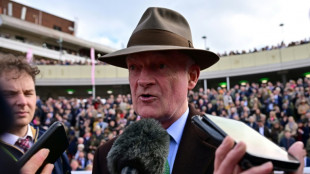 Mullins emulates O'Brien with second successive trainer's title
Mullins emulates O'Brien with second successive trainer's title
-
Ipswich relegated after one season in Premier League
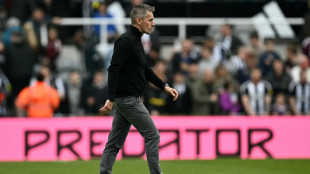
-
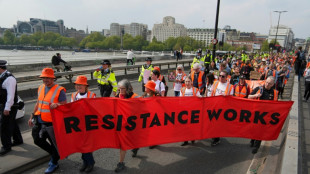 Just Stop Oil activist group holds final march
Just Stop Oil activist group holds final march
-
Djokovic crashes to nervous Arnaldi in Madrid opener
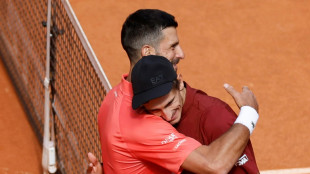
-
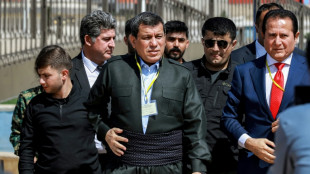 Syria's Kurds demand 'democratic decentralised' Syria
Syria's Kurds demand 'democratic decentralised' Syria
-
Leverkusen win to delay Bayern and Kane's title party
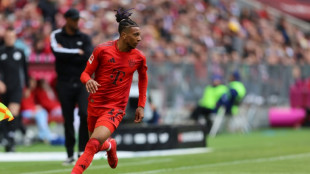
-
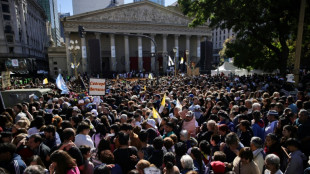 Buenos Aires farewells native pontiff with tears and calls to action
Buenos Aires farewells native pontiff with tears and calls to action
-
Turkey's opposition says Erdogan's canal plan behind latest arrests

-
 Maresca hails 'nasty' Chelsea as top five bid stays alive
Maresca hails 'nasty' Chelsea as top five bid stays alive
-
Trump raises Putin doubts after Zelensky talks at pope's funeral

-
 Major blast at Iran port kills 4, injures hundreds
Major blast at Iran port kills 4, injures hundreds
-
Napoleon's sword to be sold at auction in Paris

-
 Iran, US discuss nuclear deal in third round of talks
Iran, US discuss nuclear deal in third round of talks
-
Buenos Aires farewells native pontiff with call to action

-
 Warholm sets hurdles world record at Diamond League, Holloway shocked
Warholm sets hurdles world record at Diamond League, Holloway shocked
-
US students 'race' sperm in reproductive health stunt

-
 Wikileaks founder Assange joins crowds for pope funeral
Wikileaks founder Assange joins crowds for pope funeral
-
Leader Marc Marquez claims Spanish MotoGP sprint victory

-
 Celtic win fourth successive Scottish Premiership title
Celtic win fourth successive Scottish Premiership title
-
Jackson ends drought as Chelsea boost top five push

-
 Warholm sets 300m hurdles world record in Diamond League opener
Warholm sets 300m hurdles world record in Diamond League opener
-
Major blast at south Iran port kills 4, injures hundreds

-
 Russia says retook Kursk from Ukraine with North Korean help
Russia says retook Kursk from Ukraine with North Korean help
-
Francis laid to rest as 400,000 mourn pope 'with an open heart'

-
 Trump, Zelensky meet on sidelines of pope's funeral
Trump, Zelensky meet on sidelines of pope's funeral
-
'Shared loss': Filipino Catholics bid Pope Francis farewell

-
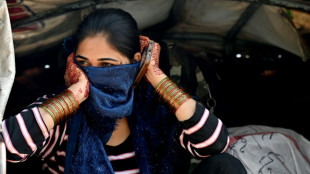 Families unable to reunite as India-Pakistan border slams shut
Families unable to reunite as India-Pakistan border slams shut
-
Major blast at south Iran port injures hundreds
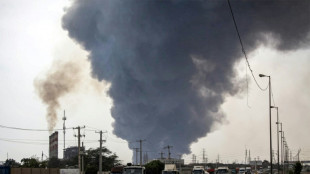
EU Pledges €800 Billion for Defence to Deter Russia
The European Union has unveiled an ambitious plan to allocate €800 billion towards bolstering its defence capabilities, a move widely interpreted as a strategic response to escalating tensions with Russia. Announced by European Commission President Ursula von der Leyen, this initiative aims to transform the EU into a formidable "defence union," shifting its economic priorities towards what some analysts have dubbed a "war economy." The decision, detailed in a recent strategic white paper, comes amid growing concerns over Russia’s military assertiveness, particularly following its ongoing aggression in Ukraine and perceived threats to NATO’s eastern flank.
The €800 billion package, to be rolled out over the coming years, includes €150 billion in EU loans and significant exemptions from the bloc’s stringent debt rules, allowing member states to finance military enhancements without breaching fiscal limits. According to sources cited by the Deutsche Presse-Agentur (DPA), the funds will target seven key areas, including air defence, cyber capabilities, and military intelligence, aiming to close critical gaps in Europe’s defence infrastructure. "If Europe wants to avoid war, it must be prepared for war," the white paper states, echoing a sentiment of deterrence through strength.
Russia’s reaction has been swift and critical. Kremlin spokesperson Dmitry Peskov accused Europe of "aggressive militarism," a charge that carries irony given Russia’s own allocation of nearly 40% of its state budget to military spending in 2025. Russian President Vladimir Putin has overseen a dramatic shift to a war economy since the invasion of Ukraine in 2022, with the country reportedly producing three million artillery shells annually—outpacing the combined output of NATO’s 32 members. This disparity in production capacity has fuelled European fears that Russia could sustain prolonged conflicts, potentially eyeing targets beyond Ukraine, such as the Baltic states or Poland.
The EU’s move also reflects unease over its reliance on the United States, particularly following uncertainties surrounding American support under a potential Donald Trump presidency. While earlier drafts of the white paper explicitly warned of over-dependence on the US, these references were softened in the final version after interventions from von der Leyen’s cabinet, as reported by DPA. Nonetheless, the €800 billion commitment underscores a push for strategic autonomy, with investments channelled into European-made defence systems to reduce external vulnerabilities.
Critics within the EU, however, question the feasibility and implications of such a shift. Transforming a civilian economy into one geared for war requires significant market interventions, a prospect that has raised doubts about political willingness and economic sustainability. The precedent of the United States during World War II—where private industries were placed under strict government oversight—looms large, yet Europe’s fragmented political landscape may complicate such coordination. Furthermore, the redirection of resources comes at a time when the EU is already grappling with energy transitions and post-pandemic recovery, with the €672 billion European Recovery Fund serving as a recent benchmark for large-scale spending.
Public sentiment, particularly in Germany, reflects growing anxiety. A Shell Youth Study cited by rbb-online.de found that the threat of war is now the top concern among young Germans, with fears of conscription and displacement driving calls for preparedness. NATO’s ongoing "Steadfast Defender" exercises, involving 90,000 troops, and the upcoming "Nordic Response" manoeuvre underscore this urgency, simulating defensive operations against a Russian incursion.
While the €800 billion figure is a political statement of intent, its implementation remains uncertain. Analysts note that it may take months, if not years, for funds to translate into tangible military assets. For now, the EU hopes this bold financial pledge will serve as a deterrent, projecting strength to Moscow while navigating internal divisions and external dependencies. Whether it instils fear in Russia or merely galvanises Europe’s resolve, the stakes for the continent’s security have rarely been higher.

China Strikes Back: Tariff War

Spain: China's Gateway to Europe

Europe's Economic Self-Sabotage

Trump fails due to Russia's tough stance

Pope Francis: A Transformative Legacy

Portugal: Living Costs Soar

Is Australia’s Economy Doomed?

DOGE Fails to Slash U.S. Spending

Slovenia’s Economic Triumph

Next Generation EU a scam?

Can Poland Rescue Europe?



